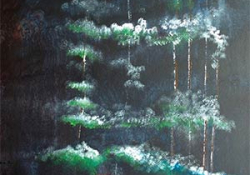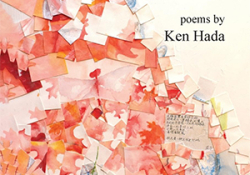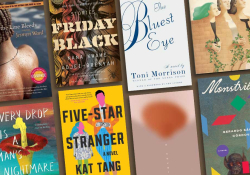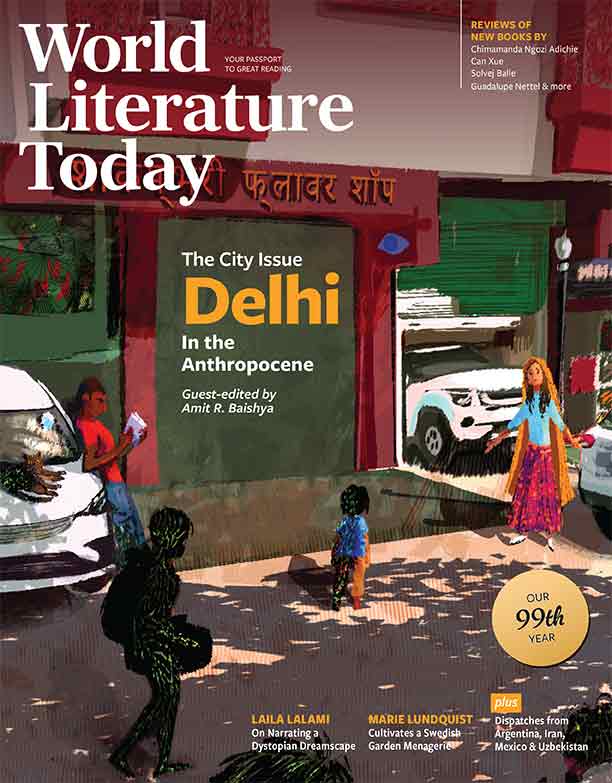Poetry Books I Return To . . .
Especially in winter, but in all seasons, a handful of poetry collections, within arm’s length, reach out to me. I find myself returning to these more frequently than others, for some reason I cannot name. They are favorites, to be sure, but they are not my only favorites. I have many more. The books contain excellent poetry, but there are so many others that are equally profound in style and structure. Some of these are written by friends, but I have left off this list the names of so many poetry-writing friends. The books in this list are authored by poets with varying levels of prestige, but in my mind even the so-called “minor poets”—to borrow Simic’s phrase—are very often profound, culturally essential, and moving.
I’m not able to definitively say why the books I have listed here are listed here. After all, I tend to view poetry, both new and old, major and minor, the way Bubba, in Forrest Gump, appreciates shrimp in his comical but very meaningful articulation, of all the possible shrimp recipes he recites. My list is a matter of taste. It is subjective, to say the least, and I invite readers to share their own recipes, make their own lists. Keep close those that lift you.
At my own public poetry readings, I am frequently asked to name my “favorite” poet—an impossible request! I usually answer that I don’t have a favorite poet, which I think is true. I have many influences, but most honest poets are favorites. I have never been able to single out one or two exclusively. As I have prepared this list, it is apparent to me, as it will be to many readers, the tremendous authors I have not included for the reader’s consideration.
For example, I have not listed the wonderfully evocative Larry D. Thomas, whose works Amazing Grace and Where Skulls Speak Wind helped me find my own voice. I have not chosen the skilled, lyrical Oklahoma poets: Paul Bowers, Paul Austin, Ron Wallace, Paul Juhasz, Ben Myers, Jim Barnes, and so many others who make regional writing in the Oklahoma context a particular, poignant force—a force underappreciated outside of Oklahoma, but each voice quite capable of standing tall on any stage anywhere. I have not chosen Anna Akhmatova, whose later work, especially, cuts my heart. I have not included Seamus Heaney, whose family sagas in Irish peat, depicted in Opened Ground, always speak to me. Nor did I include Yevgeny Yevtushenko’s magnificent Collected Poems, 1952–1990. In fact, I have included only one international poet, though I enjoy reading all kinds of poetry from across the globe.
I could also speak of Gary Worth Moody’s collections for their visceral power embedded in historical calamity. I greatly benefit from reading Major Jackson, Tracy K. Smith, Naomi Shihab Nye, and Lucille Clifton, but I did not list them. Nor did I list my sister Kai Coggin, whose identity poetry is so eloquently combined with social justice and the natural realm; nor did I list my brother Quraysh Ali Lansana, who is a master of blending the historical event within a contemporary persona, rediscovering, revealing such necessary truth. I have not chosen Simon J. Ortiz, whose themes of identity within the natural context are exquisite. I have listed only one Native American poet, though I admire Phillip Carroll Morgan’s The Fork-in-the-Road Indian Poetry Store, even as I find the overlooked histories of Native Americans reconstructed into contemporary poetry most satisfying.
But I have narrowed my list to nine books to which I often return. They speak to me. They inform my interior life. In my teaching, I am constantly telling students to read everyone and everything but not to emulate. Be impressed, be informed and thereby formed, but allow what you read to shape you toward your own voice. Perhaps what links my chosen works listed here is that they continue to do that for me. On the surface at least, in my own poetry, I don’t sound much like any of the poets I am listing. But each of them has helped me be a better writer, and a better human. Maybe it’s the difference between menu and meal—what one tastes, what one digests, enters the blood and contributes to the health, even the personality of the consumer. Perhaps what binds these together on my list is that they are comfortable, stable companions I would offer to you in conversation were you to visit me.
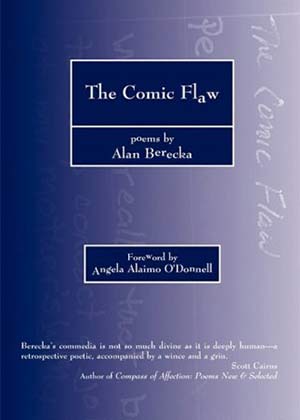 Alan Berecka
Alan Berecka
The Comic Flaw
NeoNuma Arts, 2008
Author of six books, Alan Berecka is a wonderful presenter in public, always an audience favorite, yet a seriously underrated poet who should immediately be named poet laureate of the state of Texas. Berecka is a master of the narrative poem. With expert control, his stories do not digress into unnecessary prose; they are focused and moving, even as they develop the seeker within the scene. His poems are all the more impressive for his gift of humor that lightens his contemplative, searching voice while retelling vignettes of family pain or confusing religious emphases (having once been an altar boy himself). My favorite poem of his many excellent offerings is found in his first book, The Comic Flaw. The poem “Leveling” is a father and son encounter (always a favorite theme of mine). In “Leveling,” the son is helping his father tend the grave of his mother. The son wants his dad “to think [he] / had become a man.” His father, “who cared / little for words, spoke / what I have come / to believe was his / greatest compliment: // Hey kid, / don’t forget / how to do this.”
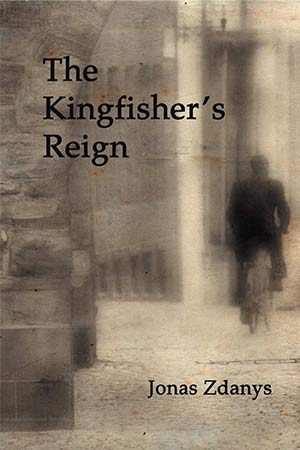 Jonas Zdanys
Jonas Zdanys
The Kingfisher’s Reign
Virtual Artists Collective, 2012
Proud of his Lithuanian heritage, Jonas Zdanys has written and translated more than fifty books in his esteemed career. His The Thin Light of Winter and Red Stones demonstrate his skill with various poetic styles; especially enviable is his control of line, moving toward what he calls the “epiphanic moment” in the poem. The Kingfisher’s Reign is a collection of prose poetry. Whatever prose poetry is, no one writes it better than Zdanys. Consider the opening from “The Revenant”: “There are days when the windows and doors of the whole world gradually open, when daylight whistles in with the thaws from the wide mouth of the river, when the margins of the sky shift with the changes of the season and we labor together for revival.” Zdanys ends the poem: “I lift my arms in greeting like heavy wings. I tremble in the gathering light.”
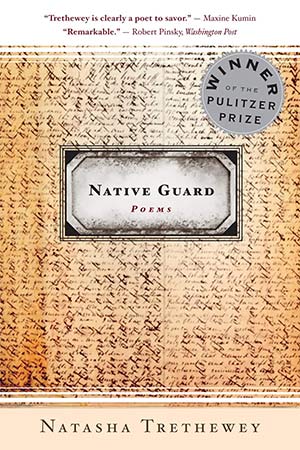
Natasha Trethewey
Native Guard
Houghton Mifflin, 2006
The moment I encountered Natasha Tretheway’s Pulitzer Prize–winning collection, I was moved by the skillful interplay between personal identity encountering racial history. The book offers a moving tribute to the Louisiana Native Guards, one of the Union’s first official black units. Skillful in traditional as well as experimental poetic utterance, her “Pastoral” suggests the complex ironies of being a daughter of the racially unjust American South:
In the dream I am with the Fugitive
Poets. We’re gathered for a photograph.
Behind us, the skyline of Atlanta
hidden by the photographer’s backdrop –
a lush pasture, green, full of soft-eyed cows
lowing, a chant that sounds like no, no. Yes,
I say to the glass of bourbon I’m offered.
. . . . . . . . . . . . . . . . . . . . . . . . . . . . . . . . . . .
Say “race,” the photographer croons. I’m in
blackface again when the flash freezes us.
My father’s white, I tell them, and rural.
You don’t hate the South? They ask. You don’t hate it?
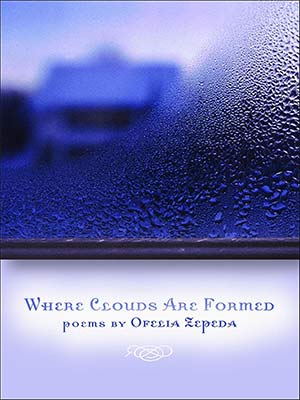 Ofelia Zepeda
Ofelia Zepeda
Where Clouds Are Formed
University of Arizona Press, 2008
In her famous novella The House on Mango Street, Sandra Cisneros writes, “You can never have too much sky . . . Here there is too much sadness and not enough sky.” Those lines remind me of Ofelia Zepeda’s collection. Zepeda’s sky covers the Sonoran Desert in south central Arizona, home to her people, the Tohono O’odham. In her work, she reminds us of an ancient civilization surviving in her lyrical lines that transcend the limitations of appropriated culture. She presents not only a historical/cultural perspective but also points us to the ecocritical issues we face today. In “Lost Prayers,” she writes: “Passing below the sacred peak, / here prayers signified by rosary beads are futile. / Calling on the Virgin Mary is useless. // Instead, one must know the language of the land. / One must know the balance of the desert. / One must know how to pray / so that all elements of nature will fall into rhythm. In “Proclamation,” she writes: “The true story of this place / recalls people walking / deserts all their lives and / continuing today, if only / in their dreams.” Zepeda inspires me to keep walking and to keep looking skyward.
 Lorna Dee Cervantes
Lorna Dee Cervantes
Emplumada
University of Pittsburgh Press, 1981
Lorna Dee Cervantes’s first book, Emplumada, is especially magnificent given the young age of the poet when many of its poems were written. This collection moves me to consider the universal plight of seeking freedom while retaining cultural identity. Like Zepeda, her works transcend the immediate cultural considerations and speak to anyone trying to make peace with her heritage. She writes in “Freeway 280”: “Once I wanted out,” wanted a place “without sun,” some place beyond the confines “of tomatoes burning / on swing shift in the greasy summer air.” Yet the seeker returns to perhaps “find it, that part of me / mown under / like a corpse / or a loose seed.” In “Oaxaca, 1974,” the speaker is looking for her true heritage, despite the conflict of being given “a name / that fights me.” I teach these two poems quite often in my various classes, as much as one can teach poetry. It is a joyful challenge to read them. The concluding lines of these poems are two of the finest ending phrases of any poetry.
 James Wright
James Wright
The Branch Will Not Break
Wesleyan University Press, 1963
For all the pain surrounding his personal life, something tender, almost timid, seeps from the underside of James Wright’s work. It’s almost as if his writing saves him, perhaps prevented him from doing something really stupid in life. His blue-collar heritage, with its rough exterior, is somehow tumbling toward greatness, unadorned, unashamed and in certain ways, unmatched in quality. His humbly stated phrasing, from the famous Ohio poems to his quasi-erotic “A Blessing,” are profound for what is unsaid, as much as what they claim. In his poem “Depressed by a Book of Bad Poetry . . .” Wright invites insects to join him. Referring to the “old grasshoppers,” he “want[s] to hear them, they have clear sounds to make. / Then lovely, far off, a dark cricket begins / In the maple trees.” Wright’s themes of alienation, loneliness, overcoming fear, within himself and the troubling effects on society at large, are routinely countered by appeals to beauty and natural order. I have found in him a brother poet, whose personal tragedies mitigated by his poetic style motivate me to write for all I am worth, seeking the beautiful while distrusting anyone who fails to understand a dark cricket.
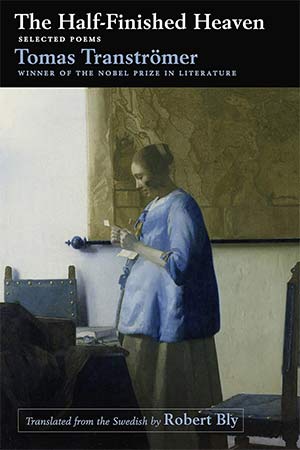 Tomas Tranströmer
Tomas Tranströmer
The Half-Finished Heaven
Trans. Robert Bly
Graywolf Press, 2017
I adore Tomas Tranströmer’s The Half-Finished Heaven. In this book, the 2011 Nobel Prize–winner offers an inspiring collection of unsurpassed excellence. In “A Winter Night,” he opens with an evocative phrase: “The storm puts its lips to the house / and blows to make a sound.” He ends that poem by returning to the storm image, which “will blow everything inside us away.” In the poem titled “The Half-Finished Heaven,” he presents a series of magnificent images, seemingly disconnected, only held together by the incompleteness of bliss. His last three images are: “The endless field under us. / Water glitters between the trees. / The lake is a window into the earth.” Though my favorite poem of his, “Sketch in October,” is not reprinted in this collection, his adherence to the influence of seasons on human behavior frequently occurs. For any of us moved by seasonal change, this acclaimed poet is a champion.
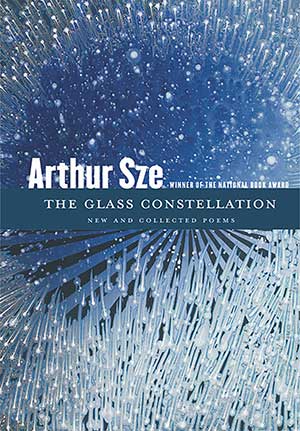 Arthur Sze
Arthur Sze
The Glass Constellation: New and Collected Poems
Copper Canyon, 2021
Arthur Sze’s 2021 collection The Glass Constellation is a tour de force, representing a long poetic life filled with astonishing poems marked by acute observation and insightful inference. Sze offers a stellar collection of lyrical poems that captivate the heart of the reader, even as the personae involved in the individual works also seems effected, sometimes dramatically, sometimes more subtly, but always moved. A consistent feature of Sze’s writing style is his collapsing of past and present into a single moment. In “Cedar Fires” the speaker “thinks” of “the antelope carved in the rock” even as “we touch the Pleiades.” His poems are full of energy, sometimes boiling below surface, or recoiling in a desert sunset, but always linking heart and mind with sensation and intellect. His poems simply will not allow a reader to be complacent.
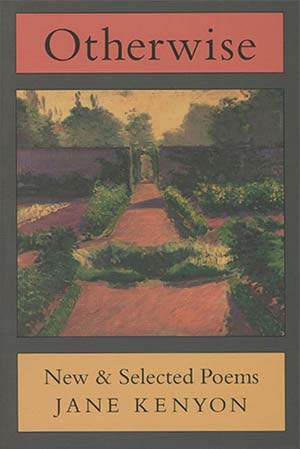 Jane Kenyon
Jane Kenyon
Otherwise: New and Selected Poems
Graywolf Press, 1996
Finally, I offer Jane Kenyon’s Otherwise, a book marked by death with dignity. The poet affords a stubborn will to keep in rhythm with the cycles of the seasons, though her own death is impending. Perhaps the most well-known poem of the collection, “Let Evening Come,” settles on me like an Old Testament psalm, riveting and ritualistic, holy in its ability to take us beyond, a sacrament for what it does not say, and how its silence makes us bow in reverence. She ends the poem with humble triumph: “Let it come, as it will, and don’t / be afraid. God does not leave us / comfortless, so let evening come.” Her fierce determination to hold onto life despite living with a terminal illness artistically reminds us of probably the oldest conflict humans endure—the fact of our mortality, and our response in that shared struggle.
Ada, Oklahoma

